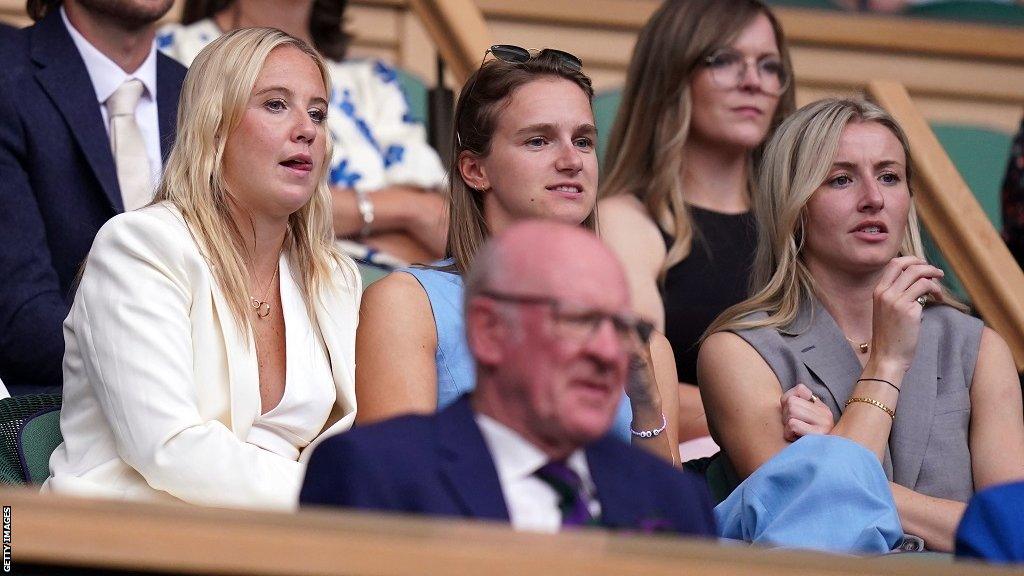Women's World Cup: Football Australia head calls for more research into ACL injuries
- Published

Arsenal players Beth Mead, Vivianne Miedema and Leah Williamson, pictured in the royal box at Wimbledon this month, have been ruled out of the Women's World Cup with ACL injuries
The head of women's football for World Cup co-hosts Australia has called for more research into anterior cruciate ligament injuries.
Football Australia's Sarah Walsh says it is a "shame" players, including England duo Leah Williamson and Beth Mead, will miss this month's tournament with the serious knee injury.
She blames a "hundred years of underinvestment" in research.
"For a long time, women have been treated like little men," she said.
"There is a real lack of research. The entire high-performance environment is built around men - designed by men for men."
Netherlands striker Vivianne Miedema - an Arsenal team-mate of Williamson and Mead - suffered an ACL injury in December and will also miss the Women's Women Cup, which will take place in Australia and New Zealand from 20 July to 20 August.
Walsh, 40, suffered serious knee injuries during her own playing career, which included 70 caps for Australia.
"I would have loved to have known if my menstrual cycle had contributed to any one of my knee reconstructions," she said on BBC's Sunday with Laura Kuenssberg programme.
"We haven't even scratched the surface and it is a hundred years of underinvestment in women's football that has brought us to this point, where we have lost a number of different players for this World Cup, which is a shame that we won't get to see them."
Research suggests that ACL injuries are more prevalent in female footballers, with estimates suggesting they are two to eight times more likely than in males.
Different theories exist as to why that is, from anatomical differences in men and women to the role played by hormones and the female menstrual cycle.
It has been argued that specific kit should be developed for women to help counter the increased risk of ACL injuries, but Walsh believes the onus should be on the scientific community to find a solution.
"I think at the heart of the issue is not [the kit] manufacturers, it is actually research," she said.
'Women's football is breaking new ground'
Infantino on possible blackout of Women's World Cup for Europe
The women's game may still be lagging behind men's football when it comes to investment and research, but Walsh has been buoyed by the strides being made on the pitch.
She believes a global surge in popularity helped Fifa when bargaining over the broadcast rights for the 2023 Women's World Cup.
Fifa president Gianni Infantino had threatened a European TV blackout if rights offers were not improved.
"We are in a really fascinating place here with women's football," said Walsh. "It is starting to break new ground and challenge the status quo.
"You would have seen that with the broadcast rights. Fifa, as rights holder, held their ground in many of the big markets in Europe to really extract the right value because if we continue to undersell these rights the ecosystem won't correct around it.
"I think that is really interesting. We are in this moment in women's sport where these female athletes are breaking new ground and I think there are other industries that will benefit from this change."
All 64 matches at the Women's World Cup will be broadcast in the UK on either the BBC or ITV, except for the final, which will be shown on both BBC One and ITV1.
The BBC will also have live commentary on BBC Radio 5 Live and 5 Sports Extra, with fans able to listen to 5 Live coverage on BBC Sounds, DAB radio and the BBC Sport website and app.